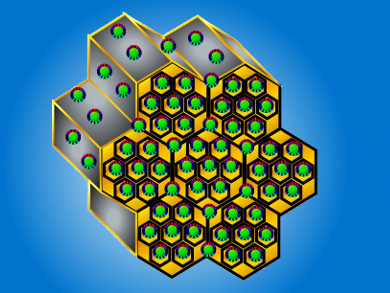Heteropoly acids (HPAs) are interesting materials that can catalyze various organic transformations owing to their strong acidity and redox behavior. The use of HPAs for hydroamination, which is an attractive method for the synthesis of amines, enamines, and imines, is known, but the lack of a proper catalyst support can significantly reduce the lifetime and recyclability of the catalyst.
Ajayan Vinu, National Institute for Materials Science, Ibaraki, Japan, and University of Queensland, Brisbane, Australia, and colleagues have demonstrated the enhanced activity and selectivity of titania-nanoparticle-stabilized HPAs in nanoporous hexagonally ordered catalytic supports for the hydroamination of activated olefins. These catalysts have excellent textural parameters, a well-ordered porous structure, and were found to be very active for the hydroamination of ethyl acrylate with both aliphatic and aromatic amines, resulting in high regio- and chemo-selectivity to anti-Markovnikov products. The performance of the nanocomposites could be tuned by adjustment of HPA in the nanoporous matrix and adjustment of the calcination temperature.
The researchers suggest that these catalysts, with excellent textural parameters and high acidity, could be used for other acid-catalyzed organic transformations, providing a new method for the synthesis of fine chemicals under mild reaction conditions.
- Titania Nanoparticles Stabilized HPA in SBA-15 for the Intermolecular Hydroamination of Activated Olefins,
Dhanashri Sawant-Dhuri, Veerappan V. Balasubramanian, Katsuhiko Ariga, Dae-Hwan Park, Jin-Ho Choy, Wang Soo Cha, Salem S. Al-deyab, Shivappa B. Halligudi, Ajayan Vinu,
ChemCatChem 2014.
DOI: 10.1002/cctc.201402449



